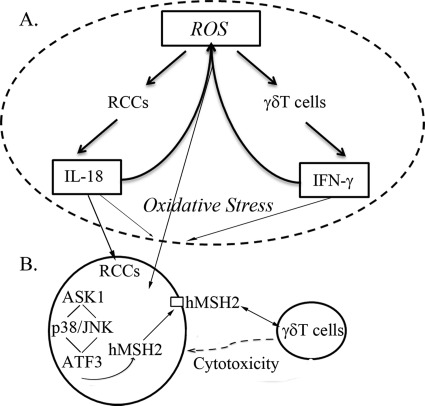FIGURE 7.
A positive feedback model for regulating ectopic expression of hMSH2 in RCC cells during oxidative stress. A, high level of ROS in oxidative stress causes excessive production of proinflammatory cytokines IL-18 and IFN-γ by RCC and γδ T cells, respectively. IL-18 is shown as a stimulator inducing ectopic expression of hMSH2 in oxidative stress. IFN-γ promotes the above trend presenting on the surface of RCC cells. The combination of both proinflammatory cytokines in turn maintains a high level of ROS, which may further induce ectopic expression of hMSH2. B, in oxidative stress-stimulated RCC cells, ectopic expression of hMSH2 is controlled by p38 MAPK and JNK pathways. A node kinase ASK1 upstream and stress-sensitive ATF3 downstream of both pathways participate in the intracellular regulation of ectopic expression of hMSH2. Because hMSH2-bearing RCC cells are susceptible to γδ T cell-mediated lysis, this positive feedback indicates a potential contribution of ectopically expressed hMSH2 to γδ T cell-mediated immunosurveillance of tumor cells in stressful conditions.

